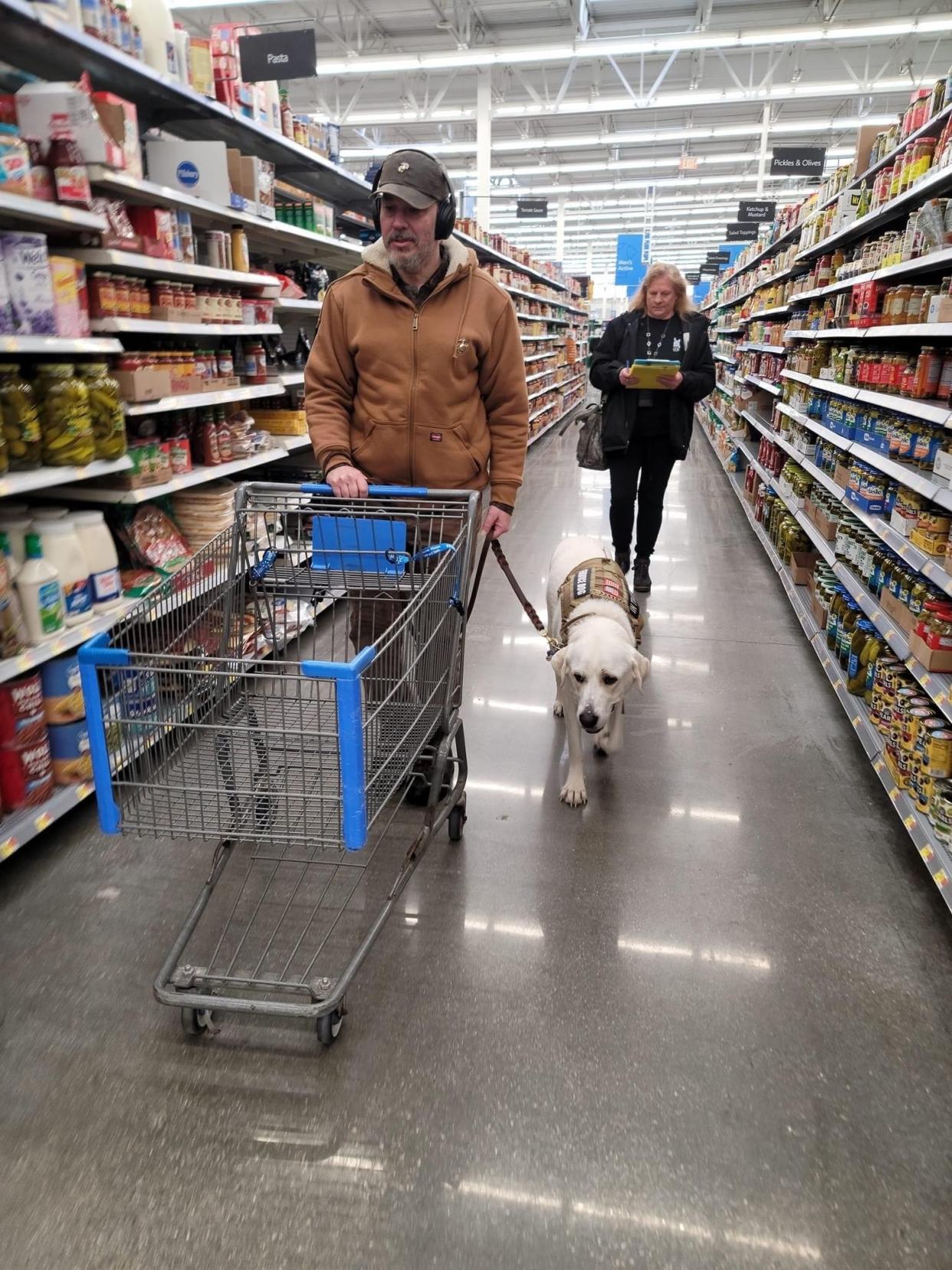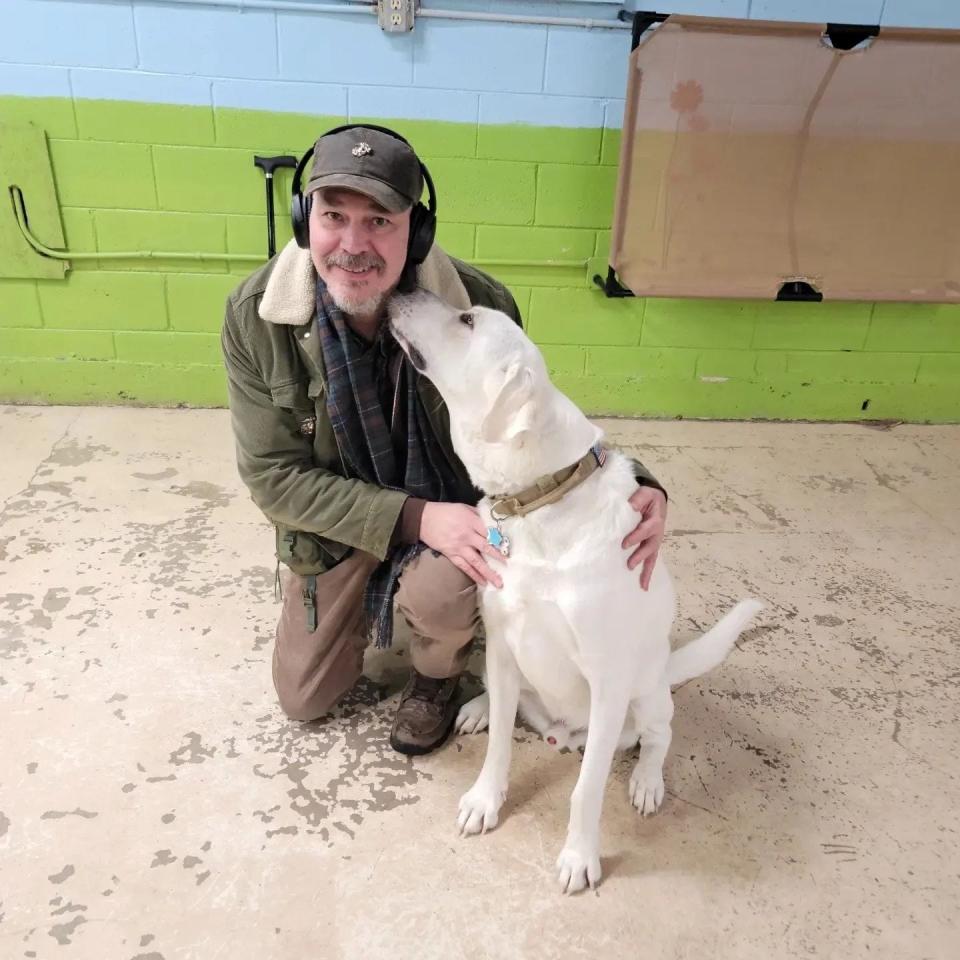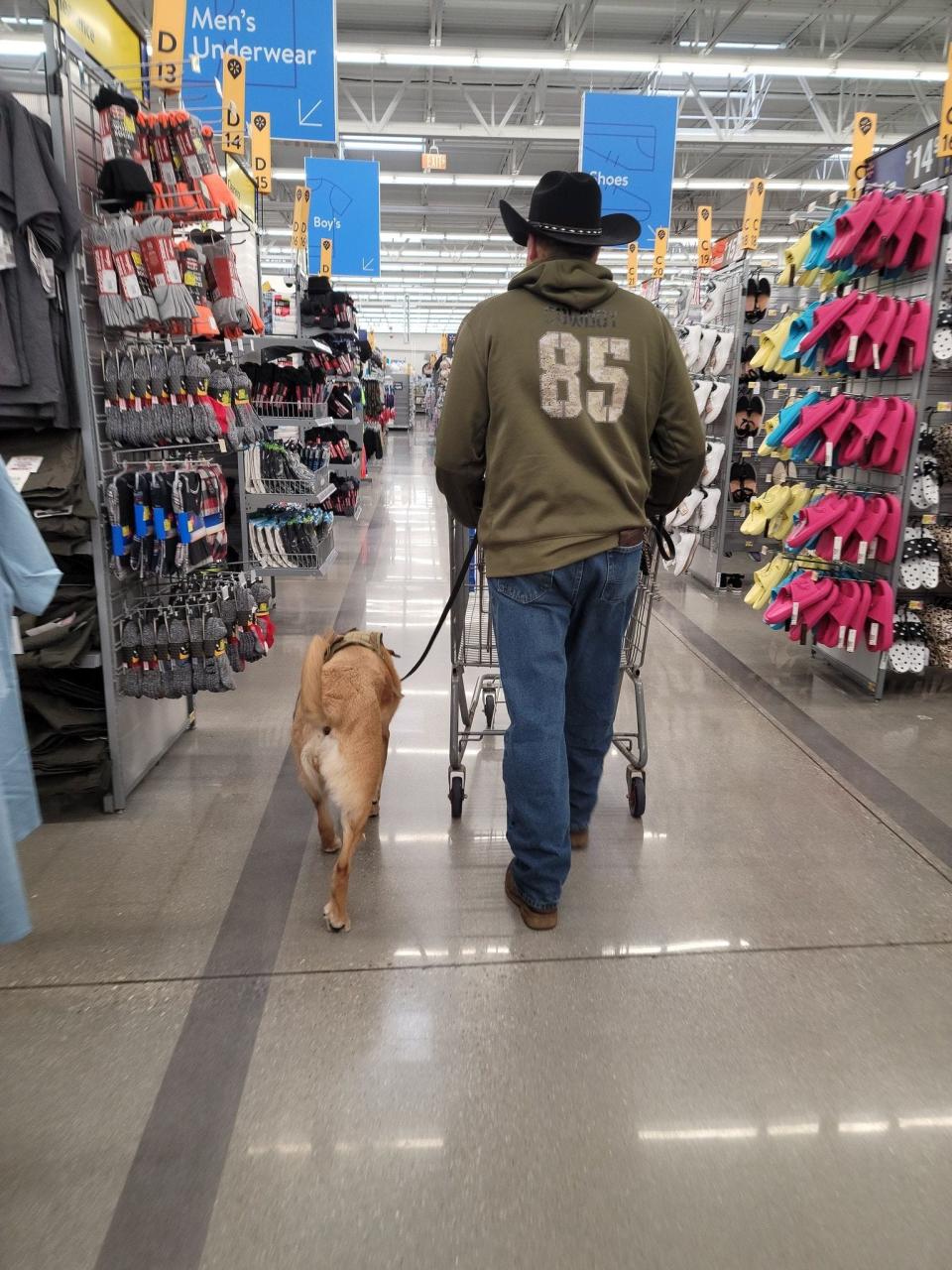How a nonprofit that pairs support dogs with military veterans saves 'two lives with one mission'

SHEBOYGAN FALLS – There's a new staff member at the Sheboygan Area Veterans Treatment Court: a dog named Oliver.
Oliver, a Great Pyrenees-Labrador retriever mix, attends monthly court hearings where he wanders around the courtroom off-leash, greeting court attendees and offering support in what can be a stressful environment. He took on his role about a month-and-a-half ago, after the Sheboygan Area Veterans Treatment Court connected with nonprofit organization Dogs 2 Dog Tags.
The Sheboygan Area Veterans Treatment Court, which began operations in 2012, addresses cases from Sheboygan, Manitowoc, Calumet, Winnebago, Fond du Lac, Washington and Ozaukee counties involving U.S. military veterans with mental and behavioral health issues that have contributed to them committing crimes.
It gives veterans a second chance — not unlike Oliver, who was rescued from an animal shelter the day he was scheduled to be euthanized.
Dogs 2 Dog Tags, an organization based in Sheboygan Falls, rescues dogs, trains them, then pairs the dogs with military veterans suffering from PTSD and anxiety. Since the nonprofit's start in 2016, Dogs 2 Dogs Tag has connected 32 pairings of dogs and veterans across Wisconsin.
Oliver was matched with his owner, Jesse Lovell, in March. Lovell, a veteran who suffers from an ear injury from his time in the service that causes pain with loud noises, had a hard time going out in public before getting a service dog. But Oliver provides Lovell with a distraction from his pain, as well as stability and pressure therapy.
When the veterans court reached out to Dogs 2 Dog Tags requesting a service dog to help out, executive director Pam Wittkopp said they knew Oliver was a perfect fit, and Lovell was more than happy to bring Oliver to court.
So far, Oliver has been to two of the monthly hearings at Sheboygan Area Veterans Court. While he's there to help the veterans, he has a tendency to befriend everyone in the courtroom — even the judge, Wittkopp said.
"Dogs just know when there's someone that's stressed, and he just naturally goes to them," Wittkopp said.

How the Dogs 2 Dog Tags program works
The idea for Dogs 2 Dog Tags originated when founder Torre Willadsen was deployed in Afghanistan as a civilian contractor working with bomb-sniffing dogs with the 7th Marine Regiment.
In Afghanistan, one of the Marine dog handlers he worked with, Chris Van Etten, lost both his legs in an explosion while on night patrol without his dog, Willadsen said.
"The first thing he asked for when he woke up was his dog," Willadsen said.
Seeing how much morale improved among the Marines when the dogs were around, Willadsen began working to get the Marines their deployment dogs after they returned home. Willadsen said he subsequently noticed many of the battalion members struggled with mental health, and he had the idea to rescue shelter dogs and train them for suicide prevention.
"It really didn't click until I got home and the first couple of years we lost a lot of guys to suicide," Willadsen said. "And then the suicide rates just kept going up in all the branches and I thought, what better way to save two lives with one mission?"
Dogs 2 Dog Tags received nonprofit status in 2016. By 2017, Willadsen was training 11 dogs on his own. They all lived at his house.
But the organization really took off in 2018, when Willadsen met Wittkopp. Wittkopp, a certified dog trainer and behavioral consultant, was a fellow volunteer at a local humane society. The pair were working to limit kennel aggression among shelter dogs by forming playgroups, and Willadsen invited Wittkopp to help with his nonprofit.
"I started working with Torre, and honestly, I joined to work with the dogs. I always told Torre that, I'm like, 'You do the vets. I'll do the dogs,'" Wittkopp said.
Then one day, Willadsen convinced Wittkopp to work with a veteran — Jimmy Adkins, who medically retired from the Army National Guard in September 2020. Adkins received his service dog, Ruby Tuesday, through Dogs 2 Dog Tags in 2019.
"After working with him, everything changed. I realized I was missing the boat, that the vet was the most important side of it," she said. "The dogs were a great benefit. But the vet was the most important side."
Willadsen said having Wittkopp as executive director has helped Dogs 2 Dogs Tag grow and reach more people. Willadsen and Wittkopp are the nonprofit's only staff members, but there are over 40 volunteers.
Dogs 2 Dog Tags not only pairs dogs with veterans, but also offers free training for the dogs of veterans and active military service members. It also set up Laika's Fund, which allows Dogs 2 Dog Tags to offer financial assistance to members of the military with dog-related expenses. The fund is named after a dog who served three tours in Afghanistan and spent her retirement helping train dogs with Dogs 2 Dog Tags until she died last year.
Dogs 2 Dog Tags places dogs with veterans as emotional support animals, and works with the veterans to help train the animals as service dogs until the dogs and veterans can pass the service dog certification test together — a process known as cooperative training, Wittkopp said. The service dog training process usually takes several months to a year, Wittkopp said. However, not all dogs are cut out to be service animals, a status that requires higher levels of obedience than an emotional support animal needs.
Dogs rescued by Dogs 2 Dog Tags live with fosters before they are placed with veterans, and Willadsen and Wittkopp do most of the training out of their homes.
However, the organization recently purchased a training facility with two large indoor, heated training areas, and is raising money to add kennels and an outdoor training area, Wittkopp said. Finishing the training facility will allow Dogs 2 Dog Tags to train up to 10 dogs at a time, rather than two or three, and will allow the organization to board, free of charge, dogs belonging to active service members who get deployed.
To apply to be paired with a service dog, veterans complete a one-page application on the Dogs 2 Dog Tags website, which gets reviewed by Willadsen, Wittkopp and one of the organization's mental health volunteers. Dogs 2 Dog Tags verifies that veterans were honorably discharged and have no criminal history of crimes against children or animals or any violent offenses that could potentially put a dog in danger, Wittkopp said. Eligible veterans then have a verbal interview with Willadsen, and once dogs are ready for placement, the organization reviews the waiting list and chooses the veteran on the list who best matches the dog's personality and who is in most need of a companion, Wittkopp said. The Dogs 2 Dog Tags waiting list is fewer than 20 people.

Service dogs can have big impact on veterans
Service dogs can save lives, Wittkopp said.
Suicide rates among U.S. veterans have historically been disproportionately higher than the rest of the population. The U.S. Department of Veterans Affairs found that in 2017 the rate of suicide among veterans was about 1.5 times the rate of non-veteran adults, adjusting for population differences regarding age and sex.
Wittkopp pointed to one recent placement to demonstrate the impact a service dog can have. She did not state the veteran's name for privacy reasons.
The veteran was in a dark place mentally before he was paired with a dog, Wittkopp said. He had a disability that prevented him from feeling comfortable in public, so he never left his apartment.
"The way he put it to me is that the walls were closing in on him, very quickly. He stayed at home all the time," Wittkopp said.
After getting paired with the dog, the veteran gained confidence to go out in public. While he previously felt the stares of strangers, now strangers nod and smile at him, he told Wittkopp.
"This weekend, he went to a Cubs game, and last weekend he went to a Mariners game, and then he went to a World War II reenactment. He's doing all this stuff, and the whole world has just opened up for him," Wittkopp said. "He went from the world just being his small apartment closing in on him to now just being out — every single day he's out doing something. It changes these guys' lives."
Similarly, Adkins said his dog Ruby Tuesday (Ruby for short) has done a lot to help with his anxiety.
"She helped me to be more mellow," Adkins said, "She's a lover, so (when) I start getting a little agitated and upset, she'll just pop right up in the face like, 'Hey dad, chill out.'"
Adkins said Dogs 2 Dog Tags continues to offer support to veterans and dogs long after placing them together.
"With their program, it's not just 'here's your dog and done.' It's constant contact — checking in, seeing how things are going," Adkins said. "It's almost like another family, because they're still there, they keep helping out in any way they can."
Contact Kelli Arseneau at (920) 213-3721 or karseneau@gannett.com. Follow her on Twitter at @ArseneauKelli.
This article originally appeared on Sheboygan Press: Dogs 2 Dog Tags works with Sheboygan area veterans treatment court

